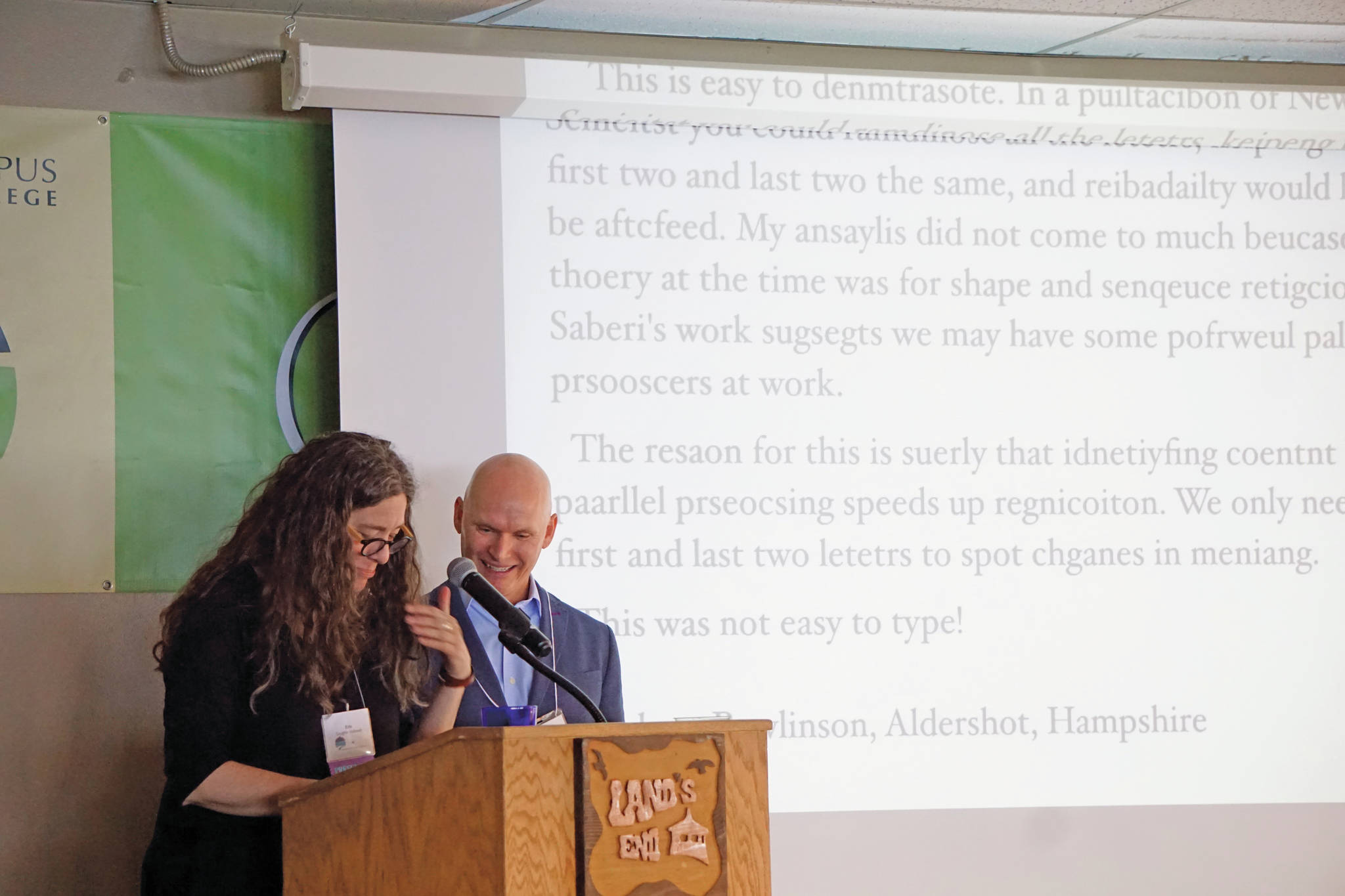In a sign that Homer’s literary arts scene will bounce back after closures prompted by the spread of the novel coronavirus, a new director for the Kachemak Bay Writers’ Conference Director has been selected and started work this week.
Erin Coughlin Hollowell, a Homer poet and adjunct instructor in the University of Alaskan’s low-residency master of fine arts program, started work on Monday. Hollowell had previously worked with the conference as assistant to Kachemak Bay Campus director emerita Carol Swartz, who helped start the conference in 2002.
Hollowell has a master of fine arts from Pacific Lutheran University and a bachelor’s degree in English from Cornell University, Ithaca, New York. She has taught at the secondary and post secondary level, including English composition and creative writing, and was previously executive director of 49 Writers, a statewide nonprofit created to support a community of Alaska writers.
Hollowell also is the executive director of Storyknife, the women-only writing retreat founded by Homer writer Dana Stabenow. Down to the last few items in its construction punch list, Storyknife had planned to begin its first full-scale residency program this summer, but has delayed that because of the pandemic. With both the writers’ conference director and Storyknife director positions part-time, Hollowell will split her time between the two jobs — and writing poetry, too.
The conference is run by the Kenai Peninsula College, Kachemak Bay Campus. KBC director Reid Brewer praised the hiring of Hollowell.
“The campus is very excited to have Erin become part of the KBC family,” Brewer said in a phone interview on Tuesday. “… She brings a lot of positive, upbeat energy. She’s going to be a great addition to our team. It’s going to be interesting to see how she guides this.”
Providentially, Brewer had decided last year to put the writers’ conference on hiatus for 2020 while he and the college looked into ways to reformat the program. As it turned out, with travel and congregate restrictions from the pandemic causing uncertainty for many events scheduled this spring and summer, the conference could have been postponed anyway.
Hollowell spoke to that point in a phone interview on Tuesday.
“I’m excited to examine what worked, what didn’t work, what people want,” she said. “I think any living organization needs time to examine its path, and I’m excited to be the one to do that.”
One of Hollowell’s first tasks will be to form an advisory group to consider how the program can be changed. Brewer and Hollowell didn’t want to speak about specific changes.
“It’s still up in the air, particularly with some of the challenges we’ve seen with programmatic changes,” Brewer said.
Supported mainly through conference fees, with support from grants and foundations, the conference doesn’t face the financial challenges of other University of Alaska programs. Brewer said he’d like to see the conference be more inclusive in all ways, especially toward university students.
“We’re trying to include as many people as we can,” he said. “… It’s been such an amazing success all these years. The hope is, is there something we can do better that might meet student needs, that might meet the needs of the community better?”
He also said the conference wants to bring in more organizations.
“We’d like to be more inclusive of the faculty we have. Gender, race, age — we’re looking for a way to cast a wider net with student involvement, community involvement, as well as the faculty that are presenting.”
Traditionally the conference has had a big-name writer as the keynote speaker, such as Naomi Shihab Nye, Anthony Doerr or Diane Ackerman. Brewer said he didn’t want to say yet if that tradition would continue.
“I don’t want to speak to anything at this point,” he said. “I don’t want to impose a vision on this committee. … I can’t give you details right now. It’s broad strokes.”
Hollowell said she had just started drawing up a plan for forming an advisory committee.
“It’s pretty early,” she said. “… I do know we want to hear from lots of people, including people who were coming to the conference and stopped, people who were never coming.”
On top of her list is to talk to other Alaska writing programs and conferences, Hollowell said.
“We’re not the only one. We can do a good job of working with these other people so we’re offering what we do best and not stepping on what they do best,” she said.
The dramatic transformation in human interaction caused by the coronavirus pandemic offers an opportunity to see how large community gatherings like the writers’ conference can continue.
“It’s interesting to me because I feel like the way information is moving in our societies and the way we gather is changing,” Hollowell said. “This happens to be a particularly auspicious moment to examine what people’s needs are for community events like this. We miss them already. … What is it that these give us? How can we get more of that?”
The author of two collections of poetry, “Pause, Traveler” and “Every Atom,” and one chapbook, “Boundaries,” Hollowell said poetry remains a focus of her life.
“I’m not stopping writing,” she said. “I will continue to do my morning, get up at the crack of dawn writing routine.”
Hollowell also will do a reading at 4 p.m. Saturday through the Zoom conferencing tool for a program called Seek Shelter out of Portland. Connect to the reading at https://zoom.us/join and type “584-693-1435.”
Brewer said he’s glad to see Hollowell drive the effort to reimagine the writers’ conference.
“It’s exciting to take a step forward and get this up and going again,” he said. “In the past the writers’ conference has been a jewel in the crown of KBC, and we’re looking to see it continue on.”


